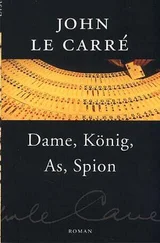John le Carr� - Tinker Tailor Soldier Spy
Здесь есть возможность читать онлайн «John le Carr� - Tinker Tailor Soldier Spy» весь текст электронной книги совершенно бесплатно (целиком полную версию без сокращений). В некоторых случаях можно слушать аудио, скачать через торрент в формате fb2 и присутствует краткое содержание. Жанр: Триллер, на английском языке. Описание произведения, (предисловие) а так же отзывы посетителей доступны на портале библиотеки ЛибКат.
- Название:Tinker Tailor Soldier Spy
- Автор:
- Жанр:
- Год:неизвестен
- ISBN:нет данных
- Рейтинг книги:3 / 5. Голосов: 1
-
Избранное:Добавить в избранное
- Отзывы:
-
Ваша оценка:
- 60
- 1
- 2
- 3
- 4
- 5
Tinker Tailor Soldier Spy: краткое содержание, описание и аннотация
Предлагаем к чтению аннотацию, описание, краткое содержание или предисловие (зависит от того, что написал сам автор книги «Tinker Tailor Soldier Spy»). Если вы не нашли необходимую информацию о книге — напишите в комментариях, мы постараемся отыскать её.
Tinker Tailor Soldier Spy — читать онлайн бесплатно полную книгу (весь текст) целиком
Ниже представлен текст книги, разбитый по страницам. Система сохранения места последней прочитанной страницы, позволяет с удобством читать онлайн бесплатно книгу «Tinker Tailor Soldier Spy», без необходимости каждый раз заново искать на чём Вы остановились. Поставьте закладку, и сможете в любой момент перейти на страницу, на которой закончили чтение.
Интервал:
Закладка:
'Is that Bill's joke?' Smiley asked, suddenly quite angry.
'Is what?'
'Is that one of Bill's jokes about materialist England, the pigs-in-clover society?'
'Could be,' said Bland and finished his drink. 'Don't you like it?'
'Not too much, no. I never knew Bill before as a radical reformer. What's come over him all of a sudden?'
'That's not radical,' Bland retorted, resenting any devaluation of his socialism, or of Haydon. 'That's just looking out the bloody window. That's just England now, man. Nobody wants that, do they?'
'So how do you propose,' Smiley demanded, hearing himself at his pompous worst, 'to destroy the acquisitive and competitive instincts in Western society, without also destroying...'
Bland had finished his drink; and the meeting too. 'Why should you be bothered? You've got Bill's job. What more do you want? Long as it lasts.'
And Bill's got my wife, Smiley thought, as Bland rose to go; and, damn him, he's told you.
The boy had invented a game. He had laid the table on its side and was rolling an empty bottle on to the gravel. Each time he started the bottle higher up the table top. Smiley left before it smashed.
Unlike Esterhase, Bland had not even bothered to lie. Lacon's files made no bones of his involvement with the Witchcraft operation:
'Source Merlin,' wrote Alleline, in a minute dated soon after Control's departure, 'is in every sense a committee operation... I cannot honestly say which of my three assistants deserves most praise. The energy of Bland has been an inspiration to us all...' He was replying to the Minister's suggestion that those responsible for Witchcraft should be honoured in the New Year's list. 'While Haydon's operational ingenuity is at times little short of Merlin's own,' he added. The medals went to all three; Alleline's appointment as Chief was confirmed, and with it his beloved knighthood.
CHAPTER EIGHTEEN
Which left me Bill, thought Smiley.
In the course of most London nights, there is one respite from alarm. Ten, twenty minutes, thirty, even an hour, and not a drunk groans or a child cries or a car's tyres whine into the collision. In Sussex Gardens it happens around three. That night it came early, at one, as Smiley stood once more at his dormer window peering down like a prisoner at Mrs Pope Graham's sand patch, where a Bedford van had recently parked. Its roof was daubed with slogans: Sydney ninety days, Athens non stop, Mary Lou here we come. A light glowed inside and he presumed some children were sleeping there in unmarried bliss. Kids, he was supposed to call them. Curtains covered the windows.
Which left me Bill, he thought, still staring at the closed curtains of the van and its flamboyant globe-trotting proclamations; which left me Bill, and our friendly little chat in Bywater Street, just the two of us, old friends, old comrades at arms, 'sharing everything', as Martindale had it so elegantly, but Ann sent out for the evening so that the men could be alone. Which left me Bill, he repeated, and felt the blood rise, and the colours of his vision heighten, and his sense of moderation begin its dangerous slide.
Who was he? Smiley had no focus on him any more. Each time he thought of him, he drew him too large, and different. Until Ann's affair with him he thought he knew Bill pretty well: both his brilliance and its limitations. He was of the pre-war set that seemed to have vanished for good, which managed to be disreputable and high-minded at the same time. His father was a high court judge, two of his several beautiful sisters had married into the aristocracy; at Oxford he favoured the unfashionable right rather than the fashionable left, but never to the point of strain. From his late teens he had been a keen explorer and amateur painter of brave, if over-ambitious stamp: several of his paintings now hung in Miles Sercombe's fatuous palace in Carlton Gardens. He had connections in every embassy and consulate across the Middle East and he used them ruthlessly. He took up remote languages with ease, and when thirty-nine came, the Circus snapped him up; they had had their eye on him for years. He had a dazzling war. He was ubiquitous and charming; he was unorthodox and occasionally outrageous. He was probably heroic. The comparison with Lawrence was inevitable.
And it was true, Smiley conceded, that Bill in his time had fiddled with substantial pieces of history; had proposed all sorts of grand designs for restoring England to influence and greatness - like Rupert Brooke he seldom spoke of Britain. But Smiley in his rare moments of objectivity could remember few that ever got off the ground.
It was the other side of Haydon's nature, by contrast, which as a colleague he had found easier to respect: the slow-burning skills of the natural agent runner, his rare sense of balance in the playing back of double agents, and the mounting of deception operations; his art of fostering affection, even love, though it ran against the grain of other loyalties.
As witness, thank you, my wife.
Perhaps Bill really is out of scale, he thought hopelessly, still grappling for a sense of proportion. Picturing him now, and putting him beside Bland, Esterhase, even Alleline, it did truthfully seem to Smiley that all of them were to a great or small extent imperfect imitations of that one original, Haydon. That their affections were like steps towards the same unobtainable ideal of the rounded man, even if the idea was itself misconceived, or misplaced; even if Bill was utterly unworthy of it. Bland in his blunt impertinence, Esterhase in his lofty artificial Englishness, Alleline with his shallow gift of leadership: without Bill they were a disarray. Smiley also knew, or thought he knew - the idea came to him now as a mild enlightenment - that Bill in turn was also very little by himself: that while his admirers - Bland, Prideaux, Alleline, Esterhase, and all the rest of the supporters' club - might find in him completeness, Bill's real trick was to use them, to live through them to complete himself; here a piece, there a piece, from their passive identities: thus disguising the fact that he was less, far less, than the sum of his apparent qualities... and finally submerging this dependence beneath an artist's arrogance, calling them the creatures of his mind...
'That's quite enough,' said Smiley aloud.
Withdrawing abruptly from this insight, dismissing it irritably as yet another theory about Bill, he cooled his overheated mind with the recollection of their last meeting.
'I suppose you want to grill me about bloody Merlin,' Bill began. He looked tired and nervy; it was his time for commuting to Washington. In the old days he would have brought an unsuitable girl and sent her to sit with Ann upstairs while they talked their business; expecting Ann to bolster his genius to her, thought Smiley cruelly. They were all of the same sort: half his age, bedraggled art school, clinging, surly; Ann used to say he had a supplier. And once to shock he brought a ghastly youth called Steggie, an assistant barman from one of the Chelsea pubs with an open shirt and a gold chain round his midriff.
'Well they do say you write the reports,' Smiley explained.
'I thought that was Bland's job,' said Bill with his foxy grin.
'Roy makes the translations,' said Smiley. 'You draft the covering reports; they're typed on your machine. The material's not cleared for typists at all.'
Bill listened carefully, brows lifted, as if at any moment he might interrupt with an objection or a more congenial topic, then hoisted himself from the deep armchair and ambled to the bookcase, where he stood a full shelf higher than Smiley. Fishing out a volume with his long fingers he peered into it, grinning.
'Percy Alleline won't do,' he announced, turning a page. 'Is that the premise?'
Читать дальшеИнтервал:
Закладка:
Похожие книги на «Tinker Tailor Soldier Spy»
Представляем Вашему вниманию похожие книги на «Tinker Tailor Soldier Spy» списком для выбора. Мы отобрали схожую по названию и смыслу литературу в надежде предоставить читателям больше вариантов отыскать новые, интересные, ещё непрочитанные произведения.
Обсуждение, отзывы о книге «Tinker Tailor Soldier Spy» и просто собственные мнения читателей. Оставьте ваши комментарии, напишите, что Вы думаете о произведении, его смысле или главных героях. Укажите что конкретно понравилось, а что нет, и почему Вы так считаете.









